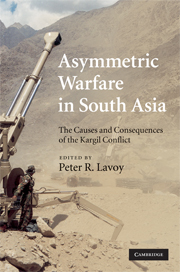Book contents
- Frontmatter
- Contents
- List of maps and tables
- List of contributors
- Preface
- List of abbreviations and acronyms
- 1 Introduction: the importance of the Kargil conflict
- Part 1 Causes and conduct of the conflict
- Part 2 Consequences and impact of the conflict
- 8 Surprise at the top of the world: India's systemic and intelligence failure
- 9 Militants in the Kargil conflict: myths, realities, and impacts
- 10 The impact of the Kargil conflict and Kashmir on Indian politics and society
- 11 The Kargil conflict's impact on Pakistani politics and society
- Part 3 Lessons learned
- Index
11 - The Kargil conflict's impact on Pakistani politics and society
from Part 2 - Consequences and impact of the conflict
Published online by Cambridge University Press: 30 March 2010
- Frontmatter
- Contents
- List of maps and tables
- List of contributors
- Preface
- List of abbreviations and acronyms
- 1 Introduction: the importance of the Kargil conflict
- Part 1 Causes and conduct of the conflict
- Part 2 Consequences and impact of the conflict
- 8 Surprise at the top of the world: India's systemic and intelligence failure
- 9 Militants in the Kargil conflict: myths, realities, and impacts
- 10 The impact of the Kargil conflict and Kashmir on Indian politics and society
- 11 The Kargil conflict's impact on Pakistani politics and society
- Part 3 Lessons learned
- Index
Summary
The Kargil conflict evokes contradictory images and responses among Pakistani elites and the public. Although precious few people in Pakistan understand what actually occurred on the frigid heights in the Kargil-Dras sector of Indian-held Kashmir, popular perceptions of the conflict have profoundly affected politics and civil–military relations in Pakistan. Seven years after the Kargil conflict, in his memoirs General Pervez Musharraf claimed that the prime minister Nawaz Sharif was fully informed about the operation, that Kargil was a successful operation, and that the prime minister showed a lack of statesmanship by running to Washington and quickly yielding to US pressure to withdraw troops from Kargil. Nawaz Sharif was quick to refute Musharraf's claims. He categorically denied any knowledge about the operation and claimed that he learned about the incursion from Indian prime minister Vajpayee. This controversy led political leaders to demand investigation by a Parliamentary Committee. Some retired generals alleged that Kargil compromised Pakistan's position on Kashmir. These allegations notwithstanding, the evidence about Kargil remains murky and both civil and military elites continue to contest the facts.
This chapter provides four main observations about the impact of the Kargil crisis on Pakistani politics and society. First, elite opinion in Pakistan remains fractured. Analysis of the Kargil operation – its purpose, its conduct, and its resolution – varies widely in press accounts and commentary, allowing different commentators to use selective media coverage to articulate their messages for their audience.
- Type
- Chapter
- Information
- Asymmetric Warfare in South AsiaThe Causes and Consequences of the Kargil Conflict, pp. 280 - 308Publisher: Cambridge University PressPrint publication year: 2009
- 1
- Cited by

